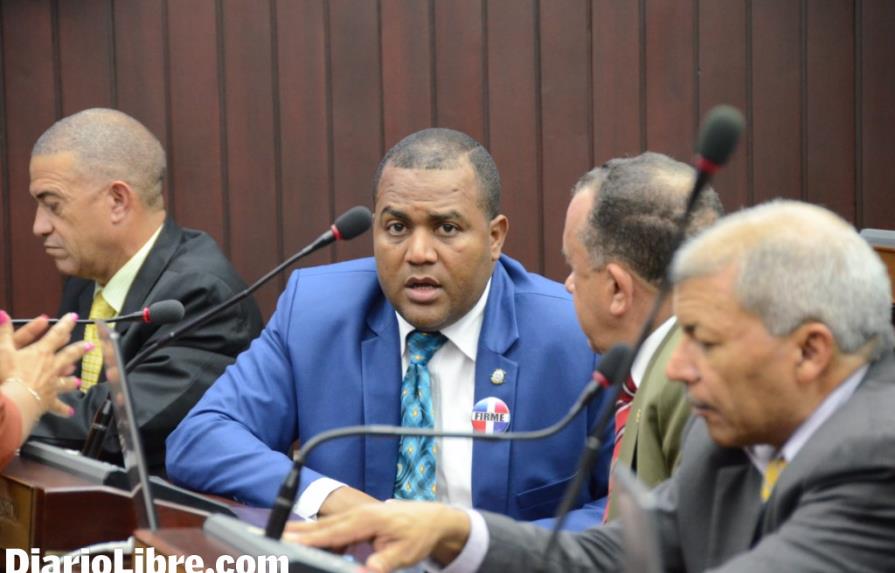The Chamber of Deputies gives urgent approval to Law of Political Parties
Voting in favor were 114 legislators, with 28 against, including those of the PRM

SD. The Chamber of Deputies declared the legislative proposal for the law on the one "organization of political parties, groups and movements," to be urgent and approved it yesterday after two consecutive readings. They accepted the legislation, with a few modifications, with the proposals agreed-upon by the principal political parties last week.
Although with several oppositions regarding its form and content, the legislation which today goes to the Senate, only changed article 70, which was eliminated at the request of some of the deputies. This article refers to the election of the representatives to the Parlacen by means of the preferential vote.
The initiative passed on the second reading with 114 votes in favor and 28 against, including among these, the votes of the Modern Revolutionary Party (PRM) whose bloc called for the rejection of the project, among other things, because it did not place a ceiling on publicity in the media and does not establish the obligation of identifying the source of private campaign financing.
But the rejection went beyond this party. "What has been done here inside is an abuse," explained Deputy Karen Ricardo of the PLD, as she left the session. She criticized the manner in which the legislation was approved, without giving the opportunity to everyone to express themselves. One of her principal complaints is that the proposal only contemplates, in article 40, a quota of a33% participation by women in the national candidacies.
Initially, the proposal was left on the table to be considered last, and Deputy Eugenio Cedeño, of the PRM, was the first to speak. He complained that they were trying to annul the function of the Congress, since it was others who were writing the law, and in his judgment, it was poorly done and was full of inconsistencies. He asked that it be approved in the first reading and then sent to a commission.
However José Jeovanny Tejada, of the Dominican Revolutionary Party (PRD) felt that the proposal had to be declared urgent and approved at once. "This law has provisos that will contribute to the harmony of the coming electoral process. Even with the imperfections that it has, it should be approved today (yesterday) and it is therefore necessary to be declared urgent and sent to the Senate," he said.
Minou Tavarez called attention to the accelerated matter in which they were working. "To approve it like it is, is to approve a law that is full of errors, both in form as well as in content, and many are important. What is the problem with discussing those issues that were newly introduced?" she questioned.
Rogelio Genao, the spokesman for the Social Christian Reformist Party (PRSC) bloc of deputies, as well as his fellow Reformist, Pedro Botello, felt that the proposal already had the necessary consensus, and in order to be consistent and coherent with what was agreed upon, it should have been approved yesterday.
After several turns by other legislators, and with the hurry expressed by the deputies of the Dominican Liberation Party (PLD had a meeting at 4:00 in the afternoon, the president of the Chamber, Abel Martinez, decided first to have a vote to close the debates, and then have a vote for the declaration of urgency.
Since they did not have sufficient votes for the last request, and the head of the PLD bloc of deputies, Ruben Maldonado, had expressed that they still had a small difference, Martinez decided to emphasize to the legislators, "without wanting to convince them," about all the efforts done by the PLD in order to obtain the consensus for this law. He recalled that they sought the mediation of Agripino Nuñez Collado and the Central Electoral Board, before which the parties, including the PRM, signed their agreement with the proposal.
"The consensus was about the work of the deputies.... There are many points about which I am not in agreement, but democracy and consensus mean getting rid of individual affairs. This is not about life or death, but society is waiting for this law," said Martinez, as he asked the deputies to cool their heads because "either we have a law today, or unfortunately we will not have it either regular or good."
After his words the motion for urgency was passed, and then the proposal was passed in the first reading with 104 votes in favor and 26 against. Finally they opened the extraordinary session in order to hear it a second time, where the great majority voted in favor.
Although with several oppositions regarding its form and content, the legislation which today goes to the Senate, only changed article 70, which was eliminated at the request of some of the deputies. This article refers to the election of the representatives to the Parlacen by means of the preferential vote.
The initiative passed on the second reading with 114 votes in favor and 28 against, including among these, the votes of the Modern Revolutionary Party (PRM) whose bloc called for the rejection of the project, among other things, because it did not place a ceiling on publicity in the media and does not establish the obligation of identifying the source of private campaign financing.
But the rejection went beyond this party. "What has been done here inside is an abuse," explained Deputy Karen Ricardo of the PLD, as she left the session. She criticized the manner in which the legislation was approved, without giving the opportunity to everyone to express themselves. One of her principal complaints is that the proposal only contemplates, in article 40, a quota of a33% participation by women in the national candidacies.
Initially, the proposal was left on the table to be considered last, and Deputy Eugenio Cedeño, of the PRM, was the first to speak. He complained that they were trying to annul the function of the Congress, since it was others who were writing the law, and in his judgment, it was poorly done and was full of inconsistencies. He asked that it be approved in the first reading and then sent to a commission.
However José Jeovanny Tejada, of the Dominican Revolutionary Party (PRD) felt that the proposal had to be declared urgent and approved at once. "This law has provisos that will contribute to the harmony of the coming electoral process. Even with the imperfections that it has, it should be approved today (yesterday) and it is therefore necessary to be declared urgent and sent to the Senate," he said.
Minou Tavarez called attention to the accelerated matter in which they were working. "To approve it like it is, is to approve a law that is full of errors, both in form as well as in content, and many are important. What is the problem with discussing those issues that were newly introduced?" she questioned.
Rogelio Genao, the spokesman for the Social Christian Reformist Party (PRSC) bloc of deputies, as well as his fellow Reformist, Pedro Botello, felt that the proposal already had the necessary consensus, and in order to be consistent and coherent with what was agreed upon, it should have been approved yesterday.
After several turns by other legislators, and with the hurry expressed by the deputies of the Dominican Liberation Party (PLD had a meeting at 4:00 in the afternoon, the president of the Chamber, Abel Martinez, decided first to have a vote to close the debates, and then have a vote for the declaration of urgency.
Since they did not have sufficient votes for the last request, and the head of the PLD bloc of deputies, Ruben Maldonado, had expressed that they still had a small difference, Martinez decided to emphasize to the legislators, "without wanting to convince them," about all the efforts done by the PLD in order to obtain the consensus for this law. He recalled that they sought the mediation of Agripino Nuñez Collado and the Central Electoral Board, before which the parties, including the PRM, signed their agreement with the proposal.
"The consensus was about the work of the deputies.... There are many points about which I am not in agreement, but democracy and consensus mean getting rid of individual affairs. This is not about life or death, but society is waiting for this law," said Martinez, as he asked the deputies to cool their heads because "either we have a law today, or unfortunately we will not have it either regular or good."
After his words the motion for urgency was passed, and then the proposal was passed in the first reading with 104 votes in favor and 26 against. Finally they opened the extraordinary session in order to hear it a second time, where the great majority voted in favor.


 Tania Molina
Tania Molina
 Tania Molina
Tania Molina